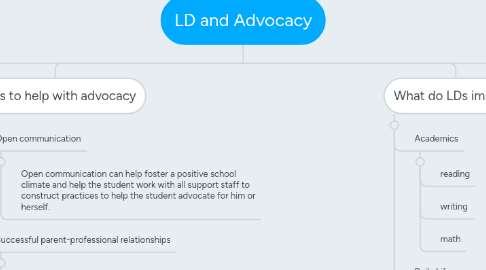
1. What LDs can do without proper advocacy
1.1. Low self esteem
1.2. Lack of confidence
1.3. Feeling dumb
1.4. A sense of failure
1.5. loss of motivation
1.6. lonliness
1.7. social withdrawal
2. What do LDs impact?
2.1. Academics
2.1.1. reading
2.1.2. writing
2.1.3. math
2.2. Daily Life
2.2.1. organizing
2.2.2. managing time
2.2.3. problem solving
2.2.4. decision making
2.2.5. dealing with unfamiliar environments
2.2.6. interpreting graphs, charts maps, multi-step instructions
2.2.7. locating things in clutter
2.2.8. looking at the whole picture
2.3. Social Life
2.3.1. interpreting facial expressions
2.3.2. understanding body language
2.3.3. understanding tones of voice
2.3.4. taking turns in conversations
3. Ways to help with advocacy
3.1. Open communication
3.1.1. Open communication can help foster a positive school climate and help the student work with all support staff to construct practices to help the student advocate for him or herself.
3.2. Successful parent-professional relationships
3.2.1. This helps result in improved outcomes for students. Some times training is needed to help foster these relationships.
3.3. Model good advocacy
3.3.1. Teach the student how to advocate for themselves, by advocating for them then gradually allowing them to do it themselves with your support.
3.3.1.1. EXAMPLE: The student needs extra time on a test. The first time you as the special education teacher can ask the teacher with the student there listening to your words, watching your body language and hearing your tone. Next time student does the talking with you there. Eventually student will not need you there.
3.4. Skills related to advocacy
3.4.1. understanding learning profiles
3.4.2. Setting SMART goals
3.4.3. having a plan and revisiting it
3.4.4. knowing how to ask for help and accommodations
4. How can advocacy help the student?
4.1. Student-teacher relationships
4.1.1. Student will no longer feel afraid to ask for accommodations
4.1.2. Student and teachers can work together to create a plan that works best for each class
4.2. Student
4.2.1. will begin to feel success
4.2.2. will no longer depend on special education teacher
4.2.3. will learn how to succeed in collaboration with supports
4.2.4. will feel a boost of motivation because he or she is feeling success
4.2.5. will boost self esteem
4.2.6. will gain confidence
4.2.7. will advocate in all aspects of life including with peers
